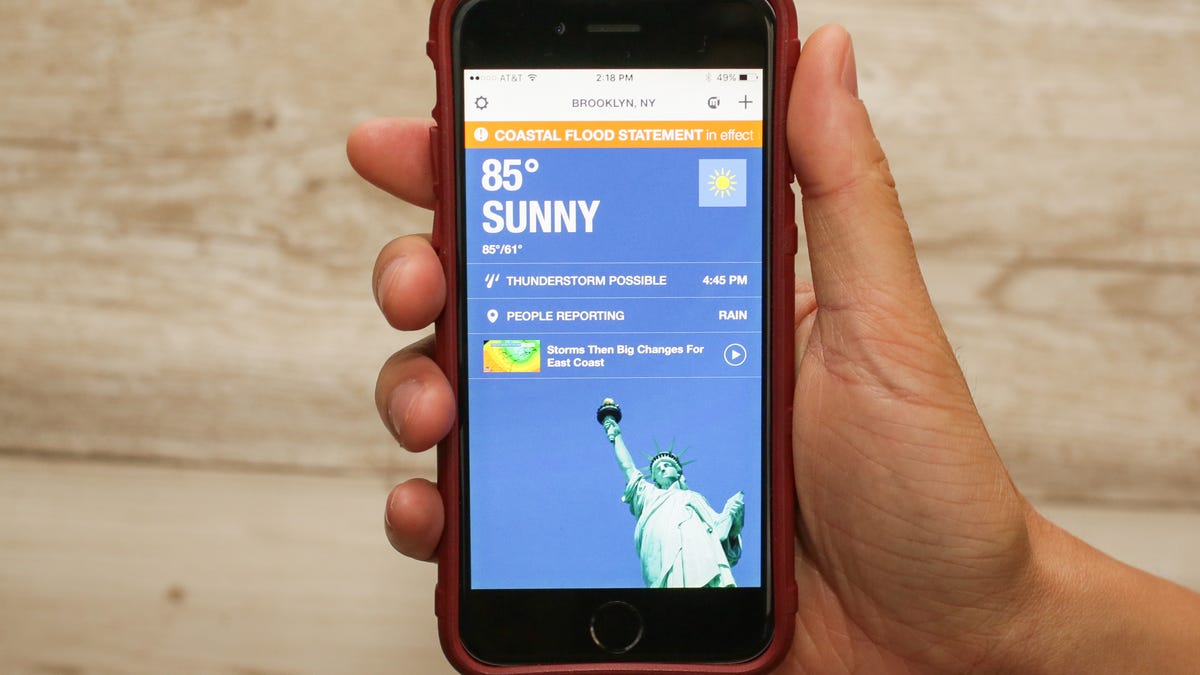Weather Channel's location data settlement doesn't mean much for your privacy
There's rain in the forecast for this privacy parade.

The app will now have to make it more obvious that it's selling your movements. But it only provides the notice when you first download the app or there's an update.
The Los Angeles city attorney on Wednesday announced a settlement with the Weather Channel over a lawsuit claiming the company's app gathered millions of people's location data without properly disclosing that the sensitive information was shared with advertisers.
The office considered the settlement a major privacy win, as it will now require The Weather Channel app to notify users that they are constantly being tracked rather than hide it in unread privacy policies.
"Our successful work to ensure meaningful consumer notice and consent and to hold The Weather Channel App accountable puts other Apps on notice: We're monitoring their practices and will continue to be vigilant in fighting for consumers," LA City Attorney Mike Feuer said in a statement.
But the terms of the settlement don't mean much for the average person's privacy. The Weather Channel's app will continue being able to track your movements and profit off your data, as long as it tells you in a pop-up when you first download the app or when it's updated later.
The company didn't respond to a request for comment.
Data privacy has become an ongoing chore. While laws like the California Consumer Privacy Act require companies to allow people to opt out of tracking and send deletion requests, much of the burden is still on you rather than the companies themselves. Your default privacy settings often provide the weakest protections, requiring you to maintain data hygiene rather than the companies that handle that information.
Data brokers often argue that they are transparent about collecting information from people, while the disclosure is often hidden in the fine print on privacy policies, which the majority of people don't read.
The Weather Channel's settlement will make that disclosure much more obvious, but research shows that you'll be just as likely to glance over that, too.
The settlement requires the Weather Channel to update the app's "Blue Screen" and "Learn More" pages by Oct. 15. The former pops up whenever you download the app or an update arrives, and the latter appears if you click on a prompt.
Here's what a sample of that disclosure could look like, according to the settlement:
Location and Your Weather
Did you know that if you allow access to your device's location and barometric pressure sensor data, it enables us automatically to provide you with more accurate local forecasts?
As our Privacy Policy describes, if you grant permission, we use your device's location to deliver forecasts and weather alerts. We also may use and share this information with trusted partners for ads, and to provide and improve our Services. Regardless of whether or not you allow location access, you can always receive accurate local forecasts by manually entering a location.
You can change permissions at any time. Learn More.
I Understand
How many of you actually read that entire post?
Researchers have found that people suffer from "consent fatigue." When so many of these disclosure pop-ups happen, like privacy policies, people will glance it over and click yes, and then be shocked to find out that their data has been tracked for years.
And you'll only get that pop-up any time the app updates, not any time you're being tracked or data about you is being sold.
"It really isn't much," said Ben Brook, the co-founder and CEO of privacy infrastructure company Transcend. "Whether they make broader efforts to provide more choice to end users is still to be determined."
In the suggested language, the Weather Channel app also doesn't disclose who those "trusted partners" are. To find that, you need to go on a separate page, which discloses ad partners like CuebIQ and LiveRamp.
LiveRamp is a major marketing company responsible for "data on-boarding," a practice where advertisers can link your online identity with offline activities like physical purchases and your location history. CuebIQ has used its troves of location data to help policymakers keep track of COVID-19's spread.
Location data is also often sold by advertisers to government agencies, including agencies behind immigration enforcement.
The most important lines from the Weather Channel's new notice required by its settlement are kept at the end. You can still get accurate information without constantly giving the app your location data, and you can opt out at any time.
The terms of LA's settlement expire within two years, but data-tracking companies may have to adapt to a more privacy-focused message if they want to stay in business, Brook said.
"For these companies to stay relevant in the long term, it's going to be very important for them to be more transparent and provide more control to end users," he said.

